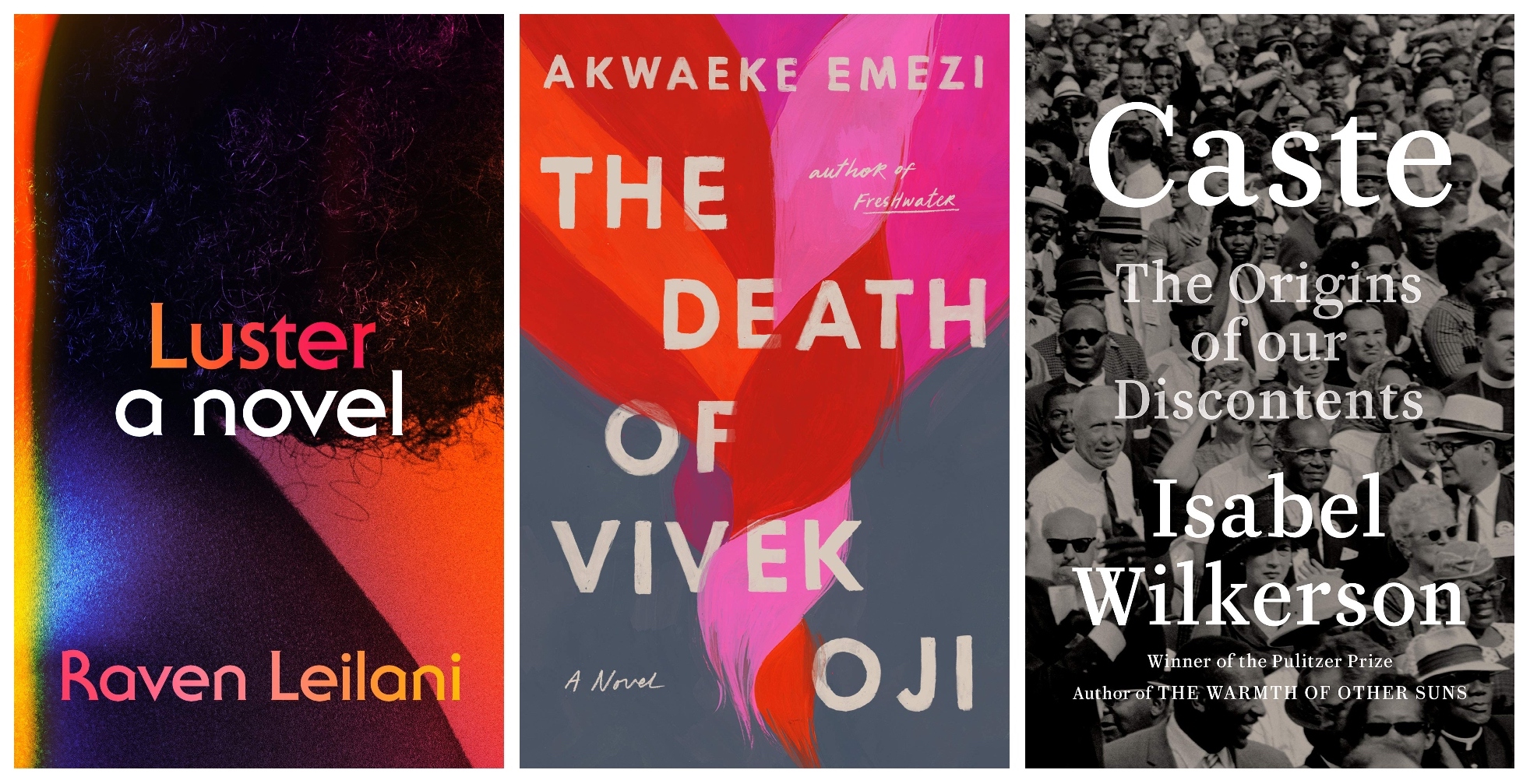Here’s a quick look at some notable books—new titles from the likes of Isabel Wilkerson, Akwaeke Emezi, our own Ed Simon, and more—that are publishing this week.
Caste: The Origins of Our Discontents by Isabel Wilkerson
 Here’s what Publishers Weekly had to say about Caste: “In this powerful and extraordinarily timely social history, Pulitzer winner Wilkerson (The Warmth of Other Suns) investigates the origins, evolution, and inner workings of America’s ‘shape-shifting, unspoken’ caste system. Tracking the inception of the country’s race-based ‘ranking of human value’ to the arrival of the first slave ship in 1619, Wilkerson draws on the works of anthropologists, geneticists, and social economists to uncover the arbitrariness of racial divisions, and finds startling parallels to the caste systems of India and Nazi Germany. The Nazis, Wilkerson notes, studied America’s restrictive immigration and anti-miscegenation laws to develop their own racial purity edicts, and were impressed by the ‘American custom of lynching’ and ‘knack for maintaining an air of robust innocence in the wake of mass death.’ While India abolished formal laws that defined its caste systems in the 1940s, and America passed civil rights measures in the ’60s, their respective hierarchies live on, Wilkerson writes, in ‘hearts and habits, institutions and infrastructures.’ Wilkerson cites studies showing that black Americans have the highest rates of stress-induced chronic diseases of all ethnic groups in the U.S., and that a third of African Americans hold antiblack biases against themselves. Incisive autobiographical anecdotes and captivating portraits of black pioneers including baseball pitcher Satchel Paige and husband-and-wife anthropologists Allison and Elizabeth Davis reveal the steep price U.S. society pays for limiting the potential of black Americans. This enthralling exposé deserves a wide and impassioned readership.”
Here’s what Publishers Weekly had to say about Caste: “In this powerful and extraordinarily timely social history, Pulitzer winner Wilkerson (The Warmth of Other Suns) investigates the origins, evolution, and inner workings of America’s ‘shape-shifting, unspoken’ caste system. Tracking the inception of the country’s race-based ‘ranking of human value’ to the arrival of the first slave ship in 1619, Wilkerson draws on the works of anthropologists, geneticists, and social economists to uncover the arbitrariness of racial divisions, and finds startling parallels to the caste systems of India and Nazi Germany. The Nazis, Wilkerson notes, studied America’s restrictive immigration and anti-miscegenation laws to develop their own racial purity edicts, and were impressed by the ‘American custom of lynching’ and ‘knack for maintaining an air of robust innocence in the wake of mass death.’ While India abolished formal laws that defined its caste systems in the 1940s, and America passed civil rights measures in the ’60s, their respective hierarchies live on, Wilkerson writes, in ‘hearts and habits, institutions and infrastructures.’ Wilkerson cites studies showing that black Americans have the highest rates of stress-induced chronic diseases of all ethnic groups in the U.S., and that a third of African Americans hold antiblack biases against themselves. Incisive autobiographical anecdotes and captivating portraits of black pioneers including baseball pitcher Satchel Paige and husband-and-wife anthropologists Allison and Elizabeth Davis reveal the steep price U.S. society pays for limiting the potential of black Americans. This enthralling exposé deserves a wide and impassioned readership.”
The Death of Vivek Oji by Akwaeke Emezi
 Here’s what Publishers Weekly had to say about The Death of Vivek Oji: “Emezi returns to adult fiction (after YA novel Pet) with a brisk tale that whirs around the mysterious death of a young Nigerian man, Vivek Oji. As a child in the 1990s, Vivek secretly identifies as a girl, the psychological strain of which causes Vivek to slip into blackouts. Only his close male cousin, Osita, recognizes the seriousness of these fugue states. (Vivek’s parents dismiss them as ‘quiet spells.’) As a teenager, Vivek grows his hair long in defiance of gender expectations, and Emezi affectingly explores the harm of threats to Vivek’s gender expression from other boys and men, who sling insults and glass bottles at him on the street. As Vivek finds solace in his female friends and Osita, he discovers he is not the only one with secrets. After his death, the heartbreaking details of which are gradually revealed, the other characters learn more about his secret life . While Emezi leans on clichés (‘hit me in the chest like a lorry’) and two-dimensional supporting characters, they offer sharp observations about the cost of transphobia and homophobia, and about the limits of honesty in their characters’ lives. Despite a few bumps, this is a worthy effort.”
Here’s what Publishers Weekly had to say about The Death of Vivek Oji: “Emezi returns to adult fiction (after YA novel Pet) with a brisk tale that whirs around the mysterious death of a young Nigerian man, Vivek Oji. As a child in the 1990s, Vivek secretly identifies as a girl, the psychological strain of which causes Vivek to slip into blackouts. Only his close male cousin, Osita, recognizes the seriousness of these fugue states. (Vivek’s parents dismiss them as ‘quiet spells.’) As a teenager, Vivek grows his hair long in defiance of gender expectations, and Emezi affectingly explores the harm of threats to Vivek’s gender expression from other boys and men, who sling insults and glass bottles at him on the street. As Vivek finds solace in his female friends and Osita, he discovers he is not the only one with secrets. After his death, the heartbreaking details of which are gradually revealed, the other characters learn more about his secret life . While Emezi leans on clichés (‘hit me in the chest like a lorry’) and two-dimensional supporting characters, they offer sharp observations about the cost of transphobia and homophobia, and about the limits of honesty in their characters’ lives. Despite a few bumps, this is a worthy effort.”
Luster by Raven Leilani
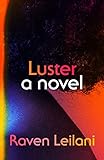 Here’s what Publishers Weekly had to say about Luster: “Leilani debuts with a moving examination of a young black woman’s economic desperation and her relationship to violence. Edie is a 20-something low-level employee at a New York city publishing house. She paints on the side, but not often or well enough to comfortably call herself an artist, and she’s infatuated with Eric Walker, a married white man twice her age she met online, with whom she explores his thirst for aggressive domination (‘I think I’d like to hit you,’ he says; she lets him) and is caught breaking the rules of Eric’s open marriage (no going to his house). After Edie loses her job, Eric’s wife, Rebecca, invites her to stay with them in New Jersey. The arrangement functions partly to vex Eric and partly to support Akila, the Walkers’ adopted black daughter. An inevitable betrayal cracks the household’s veneer of civility, and suddenly Edie must make new arrangements. She does so in earnest, but not before a horrific scene in which Edie and Akila are victims of police brutality. Edie’s ability to navigate the complicated relationships with the Walkers exhibits Leilani’s mastery of nuance, and the narration is perceptive, funny, and emotionally charged. Edie’s frank, self-possessed voice will keep a firm grip on readers all the way to the bitter end.”
Here’s what Publishers Weekly had to say about Luster: “Leilani debuts with a moving examination of a young black woman’s economic desperation and her relationship to violence. Edie is a 20-something low-level employee at a New York city publishing house. She paints on the side, but not often or well enough to comfortably call herself an artist, and she’s infatuated with Eric Walker, a married white man twice her age she met online, with whom she explores his thirst for aggressive domination (‘I think I’d like to hit you,’ he says; she lets him) and is caught breaking the rules of Eric’s open marriage (no going to his house). After Edie loses her job, Eric’s wife, Rebecca, invites her to stay with them in New Jersey. The arrangement functions partly to vex Eric and partly to support Akila, the Walkers’ adopted black daughter. An inevitable betrayal cracks the household’s veneer of civility, and suddenly Edie must make new arrangements. She does so in earnest, but not before a horrific scene in which Edie and Akila are victims of police brutality. Edie’s ability to navigate the complicated relationships with the Walkers exhibits Leilani’s mastery of nuance, and the narration is perceptive, funny, and emotionally charged. Edie’s frank, self-possessed voice will keep a firm grip on readers all the way to the bitter end.”
To the Lake: A Balkan Journey of War and Peace by Kapka Kassabova
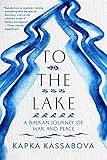 Here’s what Publishers Weekly had to say about To the Lake: “Bulgarian-born poet Kassabova (Border: A Journey to the Edge of Europe), who now lives in Scotland, explores the religious, political, and ethnic tangles of the Balkans in this potent and meditative travelogue steeped in family history. Lake Ohrid and Lake Prespa, nestled in the mountains between western Macedonia and eastern Albania, provide Kassabova’s entry point into the region as she searches for her maternal grandmother’s roots: ‘What I had come to seek was as simple as it was elusive—continuity of being through continuity of place.’ During a tour of Lake Ohrid’s eastern shore, Kassabova sketches Macedonia’s history, vividly describes its natural beauty, and recounts the life of her great-grandfather, Kosta, who rowed across the lake in 1929 to escape political persecution in Bulgaria. Exploring Lake Prespa, Kassabova delves into Albania’s long history of repression and violence, including the ruthless rule of communist dictator Enver Hoxha. Despite the grim history of regional strife, Kassabova’s faith in the power of forgiveness leads her to draw hopeful conclusions about the past and the future of the Balkans. This heartfelt exploration of the intersections between geography, history, and identity mesmerizes.”
Here’s what Publishers Weekly had to say about To the Lake: “Bulgarian-born poet Kassabova (Border: A Journey to the Edge of Europe), who now lives in Scotland, explores the religious, political, and ethnic tangles of the Balkans in this potent and meditative travelogue steeped in family history. Lake Ohrid and Lake Prespa, nestled in the mountains between western Macedonia and eastern Albania, provide Kassabova’s entry point into the region as she searches for her maternal grandmother’s roots: ‘What I had come to seek was as simple as it was elusive—continuity of being through continuity of place.’ During a tour of Lake Ohrid’s eastern shore, Kassabova sketches Macedonia’s history, vividly describes its natural beauty, and recounts the life of her great-grandfather, Kosta, who rowed across the lake in 1929 to escape political persecution in Bulgaria. Exploring Lake Prespa, Kassabova delves into Albania’s long history of repression and violence, including the ruthless rule of communist dictator Enver Hoxha. Despite the grim history of regional strife, Kassabova’s faith in the power of forgiveness leads her to draw hopeful conclusions about the past and the future of the Balkans. This heartfelt exploration of the intersections between geography, history, and identity mesmerizes.”
What Happens at Night by Peter Cameron
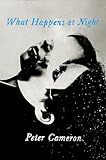 Here’s what Publishers Weekly had to say about What Happens at Night: “In this dreamlike, resonant fable, Cameron (Coral Glynn) depicts a pair of lost souls who travel to the edge of the world. Two unnamed New Yorkers in a frosty marriage disembark from a train in Borgarfjaroasysla, a fictional, far-northern European city, and check into the elegant Grand Imperial Hotel. The childless couple has come to the wintry land to adopt a baby boy from an orphanage, and they’re baffled, frustrated, and occasionally comforted by the city’s inhabitants as they endure delays with the adoption. There’s a mannered quality to the pervasive strangeness (a receptionist maintains an ‘impassive, unseeing attitude’; long dark days end before they begin), and the occasionally solemn dialogue doesn’t help (‘I know what I’ve become. How I am. What I am’), but generally Cameron doles out the right amount of eeriness and eccentricity. Livia Pinheiro-Rima, a bighearted lounge singer and pathological liar who looks after the adrift couple, is particularly memorable. Less convincing is the portrait of a local healer, Brother Emmanuel, whose mystic aura inspires the wife with hopes of recovery from her cancer. A torpor hangs over the events and protagonists, who respond passively to the bizarre world around them. While the idiosyncratic setting can sometimes serve as a foil for the couple, their response makes Cameron’s admirable tale emotionally affecting.”
Here’s what Publishers Weekly had to say about What Happens at Night: “In this dreamlike, resonant fable, Cameron (Coral Glynn) depicts a pair of lost souls who travel to the edge of the world. Two unnamed New Yorkers in a frosty marriage disembark from a train in Borgarfjaroasysla, a fictional, far-northern European city, and check into the elegant Grand Imperial Hotel. The childless couple has come to the wintry land to adopt a baby boy from an orphanage, and they’re baffled, frustrated, and occasionally comforted by the city’s inhabitants as they endure delays with the adoption. There’s a mannered quality to the pervasive strangeness (a receptionist maintains an ‘impassive, unseeing attitude’; long dark days end before they begin), and the occasionally solemn dialogue doesn’t help (‘I know what I’ve become. How I am. What I am’), but generally Cameron doles out the right amount of eeriness and eccentricity. Livia Pinheiro-Rima, a bighearted lounge singer and pathological liar who looks after the adrift couple, is particularly memorable. Less convincing is the portrait of a local healer, Brother Emmanuel, whose mystic aura inspires the wife with hopes of recovery from her cancer. A torpor hangs over the events and protagonists, who respond passively to the bizarre world around them. While the idiosyncratic setting can sometimes serve as a foil for the couple, their response makes Cameron’s admirable tale emotionally affecting.”
The Disaster Tourist by Yun Ko-Eun (translated by Lizzie Buehler)
 Here’s what Publishers Weekly had to say about The Disaster Tourist: “South Korean author Yun’s spare but provocative novel (after the collection Table for One) offers perceptive satire laced with disconcerting imagery. In her mid-30s, Yona Ko has devoted the last decade of her life to her employer, Jungle, which offers package tours to areas of the world ravaged by disasters, from hurricanes to nuclear meltdowns. After being sexually assaulted by her boss and assigned to a new role, Yona suspects she’s being pushed out of the company. On the verge of quitting, she’s given a new opportunity: evaluate the disaster ecosystem on a Vietnamese island (a sinkhole, a volcano) and determine whether the destination should be kept in Jungle’s portfolio. Upon arriving, Yona soon realizes that the island’s power brokers are aware that their tourist income is imperiled, and she is appalled when an investor tells her of a plan to engineer a sinkhole during a village festival that would kill at least 100 people, after which they would use international aid for urban redevelopment. In Yona’s increasingly bizarre encounters, she learns just how severe the local environmental degradation is and the frightening extent of corporate greed. Yun cleverly combines absurdity with legitimate horror and mounting dread. With its arresting, nightmarish island scenario, this work speaks volumes about the human cost of tourism in developing countries.”
Here’s what Publishers Weekly had to say about The Disaster Tourist: “South Korean author Yun’s spare but provocative novel (after the collection Table for One) offers perceptive satire laced with disconcerting imagery. In her mid-30s, Yona Ko has devoted the last decade of her life to her employer, Jungle, which offers package tours to areas of the world ravaged by disasters, from hurricanes to nuclear meltdowns. After being sexually assaulted by her boss and assigned to a new role, Yona suspects she’s being pushed out of the company. On the verge of quitting, she’s given a new opportunity: evaluate the disaster ecosystem on a Vietnamese island (a sinkhole, a volcano) and determine whether the destination should be kept in Jungle’s portfolio. Upon arriving, Yona soon realizes that the island’s power brokers are aware that their tourist income is imperiled, and she is appalled when an investor tells her of a plan to engineer a sinkhole during a village festival that would kill at least 100 people, after which they would use international aid for urban redevelopment. In Yona’s increasingly bizarre encounters, she learns just how severe the local environmental degradation is and the frightening extent of corporate greed. Yun cleverly combines absurdity with legitimate horror and mounting dread. With its arresting, nightmarish island scenario, this work speaks volumes about the human cost of tourism in developing countries.”
Love After Love by Ingrid Persaud
 Here’s what Publishers Weekly had to say about Love After Love: “Persaud’s auspicious debut traces the gut-wrenching lives of a makeshift Trinidadian family over the past two decades. After Betty Ramdin’s abusive, alcoholic husband, Sunil, dies, Betty invites a reserved math teacher, Mr. Chetan, to rent a room in her house. Chetan, who knows Betty as an administrator at his school, accepts the offer and forms a bond with Betty’s five-year-old son, Solo. The three quickly form a de facto family, and Chetan shines in the kitchen (‘She hand nowhere near sweet like mine,’ he says). Cracks emerge later, as Betty’s attempt to initiate sex with Chetan falters when he reveals he is gay, and Solo, now a teenager, overhears Betty confess to Chetan that she caused Sunil’s death by pushing him down a set of stairs. After Solo graduates high school, he illegally immigrates to New York City and cuts off all contact with his mother. Though Solo’s uncle helps him find work, he isolates himself socially and descends into self-harm. Meanwhile, Chetan, who came of age when sodomy was illegal in Trinidad, navigates clandestine relationships with a controlling police officer and an old flame, now married. After Solo hears tragic news from Trinidad, he returns for a bittersweet reunion. In chapters alternately narrated by Solo, Betty, and Chetan in vibrant Trinidadian dialect, Persaud expertly maps the trio’s emotional development and builds a complicated yet seamless plot full of indelible insights and poignant moments. This affecting family saga shines brightly.”
Here’s what Publishers Weekly had to say about Love After Love: “Persaud’s auspicious debut traces the gut-wrenching lives of a makeshift Trinidadian family over the past two decades. After Betty Ramdin’s abusive, alcoholic husband, Sunil, dies, Betty invites a reserved math teacher, Mr. Chetan, to rent a room in her house. Chetan, who knows Betty as an administrator at his school, accepts the offer and forms a bond with Betty’s five-year-old son, Solo. The three quickly form a de facto family, and Chetan shines in the kitchen (‘She hand nowhere near sweet like mine,’ he says). Cracks emerge later, as Betty’s attempt to initiate sex with Chetan falters when he reveals he is gay, and Solo, now a teenager, overhears Betty confess to Chetan that she caused Sunil’s death by pushing him down a set of stairs. After Solo graduates high school, he illegally immigrates to New York City and cuts off all contact with his mother. Though Solo’s uncle helps him find work, he isolates himself socially and descends into self-harm. Meanwhile, Chetan, who came of age when sodomy was illegal in Trinidad, navigates clandestine relationships with a controlling police officer and an old flame, now married. After Solo hears tragic news from Trinidad, he returns for a bittersweet reunion. In chapters alternately narrated by Solo, Betty, and Chetan in vibrant Trinidadian dialect, Persaud expertly maps the trio’s emotional development and builds a complicated yet seamless plot full of indelible insights and poignant moments. This affecting family saga shines brightly.”
Migrations by Charlotte McConaghy
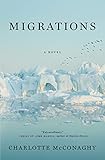 Here’s what Publishers Weekly had to say about Migrations: “Young adult novelist McConaghy (the Chronicles of Kaya series) makes her adult debut with the clunky chronicle of Franny Stone, a troubled woman who follows a flock of endangered Arctic terns on what is believed to be their final migration home. Franny’s mother, who vanished when Franny was seven, warned her that women in their family are unable to resist the urge to wander. While working at a university in Galway, she meets ornithologist Niall Lynch, who immediately declares they’ll spend their lives together, and they implausibly marry. Unfortunately, Franny’s overwhelming desire to travel, her sorrow over their stillborn daughter, and a sleepwalking episode in which she chokes Niall drive a wedge in their marriage. Niall had always longed to track the terns, and Franny does so by convincing a fishing boat captain that she can help him find fish in exchange for transportation. Despite the ragtag crew’s initial distrust of Franny, she becomes part of the team. McConaghy divulges more about Franny’s dark past as she writes Niall letters and reflects on their relationship, as well as the true nature of her quest. While McConaghy’s plot is engaging, her writing can be a heavy-handed distraction (‘out flies my soul, sucked through my pores’). Lovers of ornithology and intense drama will find what they need in this uneven tale.”
Here’s what Publishers Weekly had to say about Migrations: “Young adult novelist McConaghy (the Chronicles of Kaya series) makes her adult debut with the clunky chronicle of Franny Stone, a troubled woman who follows a flock of endangered Arctic terns on what is believed to be their final migration home. Franny’s mother, who vanished when Franny was seven, warned her that women in their family are unable to resist the urge to wander. While working at a university in Galway, she meets ornithologist Niall Lynch, who immediately declares they’ll spend their lives together, and they implausibly marry. Unfortunately, Franny’s overwhelming desire to travel, her sorrow over their stillborn daughter, and a sleepwalking episode in which she chokes Niall drive a wedge in their marriage. Niall had always longed to track the terns, and Franny does so by convincing a fishing boat captain that she can help him find fish in exchange for transportation. Despite the ragtag crew’s initial distrust of Franny, she becomes part of the team. McConaghy divulges more about Franny’s dark past as she writes Niall letters and reflects on their relationship, as well as the true nature of her quest. While McConaghy’s plot is engaging, her writing can be a heavy-handed distraction (‘out flies my soul, sucked through my pores’). Lovers of ornithology and intense drama will find what they need in this uneven tale.”
In the Valley by Ron Rash
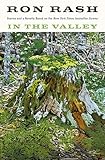 Here’s what Publishers Weekly had to say about In the Valley: “The 10 stories in Rash’s revelatory collection (after The Risen) range from contemporary slices of life to period character studies, and from quiet closet dramas to miniature epics. The title story, a pendant to his 2008 novel, Serena, flirts with the mythological in its extraordinary depiction of Serena Pemberton, the steel-willed owner of a Depression-era logging camp, who rules over her employees and the forests that they’re felling like a raging Fury. Standouts among the book’s contemporary entries include ‘L’homme Blessé,’ in which a grieving widower finds consolation in prehistoric art reproduced by a traumatized WWII veteran on the walls of his room; ‘Ransom,’ about the peculiar bond a kidnap victim develops with her abductor; and ‘Sad Man in the Sky,’ whose main character, a newly released con, engineers an audacious airborne stunt to deliver presents to children that a restraining order prevents him from visiting. In simple but eloquent prose, Rash describes the vulnerabilities, fears, and desires of his characters and shows how often they unite persons from vastly different walks of life and social strata. The skillful craftsmanship of these tales and their subtle but powerful climaxes make for profoundly moving reading.”
Here’s what Publishers Weekly had to say about In the Valley: “The 10 stories in Rash’s revelatory collection (after The Risen) range from contemporary slices of life to period character studies, and from quiet closet dramas to miniature epics. The title story, a pendant to his 2008 novel, Serena, flirts with the mythological in its extraordinary depiction of Serena Pemberton, the steel-willed owner of a Depression-era logging camp, who rules over her employees and the forests that they’re felling like a raging Fury. Standouts among the book’s contemporary entries include ‘L’homme Blessé,’ in which a grieving widower finds consolation in prehistoric art reproduced by a traumatized WWII veteran on the walls of his room; ‘Ransom,’ about the peculiar bond a kidnap victim develops with her abductor; and ‘Sad Man in the Sky,’ whose main character, a newly released con, engineers an audacious airborne stunt to deliver presents to children that a restraining order prevents him from visiting. In simple but eloquent prose, Rash describes the vulnerabilities, fears, and desires of his characters and shows how often they unite persons from vastly different walks of life and social strata. The skillful craftsmanship of these tales and their subtle but powerful climaxes make for profoundly moving reading.”
Talking Animals by Joni Murphy
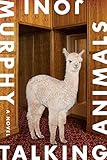 Here’s what Publishers Weekly had to say about Talking Animals: “In this bighearted if flawed eco-fiction satire, pun-loving alpaca Alfonzo Velloso Faca takes on corruption and climate change. The novel’s sweeping opening describes an alternate-reality New York City populated by a menagerie of talking animals, a hierarchical city arranged by ‘unwritten laws of class, order, family, genus, and species.’ Alfonzo, the son of immigrant Bolivian camelids, toils in the city’s Department of Records. He is also nearing completion of a dissertation in mammalian studies ‘that would tease out the myth of empire from the unwashed raw wool of reality.’ Rot is all around him, from the city’s venal equine mayor (the scion of an elite family), to the polluted, rising oceans and the troubling demonization of sea creatures (‘They hate our legs and our free society,’ claims a porcine city hall official). Alfonzo’s best friend, a llama named Mitchell, introduces him to the nonviolent Sea Equality Revolutionary Front (SERF) and embroils him in an effort to expose the mayor’s graft and bring down his antisea administration. The intrigue takes its time heating up and never fully comes to a boil, and speechifying abounds in the dialogue. Murphy has great fun animalizing the streets of N.Y.C. and writes beautiful paeans to the sea, but the gags, heady sociological riffs, and lyricism can’t quite sustain the novel.”
Here’s what Publishers Weekly had to say about Talking Animals: “In this bighearted if flawed eco-fiction satire, pun-loving alpaca Alfonzo Velloso Faca takes on corruption and climate change. The novel’s sweeping opening describes an alternate-reality New York City populated by a menagerie of talking animals, a hierarchical city arranged by ‘unwritten laws of class, order, family, genus, and species.’ Alfonzo, the son of immigrant Bolivian camelids, toils in the city’s Department of Records. He is also nearing completion of a dissertation in mammalian studies ‘that would tease out the myth of empire from the unwashed raw wool of reality.’ Rot is all around him, from the city’s venal equine mayor (the scion of an elite family), to the polluted, rising oceans and the troubling demonization of sea creatures (‘They hate our legs and our free society,’ claims a porcine city hall official). Alfonzo’s best friend, a llama named Mitchell, introduces him to the nonviolent Sea Equality Revolutionary Front (SERF) and embroils him in an effort to expose the mayor’s graft and bring down his antisea administration. The intrigue takes its time heating up and never fully comes to a boil, and speechifying abounds in the dialogue. Murphy has great fun animalizing the streets of N.Y.C. and writes beautiful paeans to the sea, but the gags, heady sociological riffs, and lyricism can’t quite sustain the novel.”
Imperfect Women by Araminta Hall
 Here’s what Publishers Weekly had to say about Imperfect Women: “This heart-wrenching psychological thriller from British author Hall (Our Kind of Cruelty) charts the fraught lives of three best friends from university. Nancy Hennessy has stayed ostensibly close to Eleanor Meakins and Mary Smithson in the nearly three decades since they were at Oxford together. When Nancy is murdered after meeting with her secret lover, Eleanor’s affair with Nancy’s husband becomes so engrossing and guilt-wracked that it keeps Eleanor from helping Mary with her husband’s illness. Three successive narratives center on the interior life of each woman: Eleanor immediately after the murder, Nancy in the time leading up to her death, and Mary further along in the murder’s aftermath. Hall shows each woman being emotionally drawn to doing something she knows is awful, revolting against feeling trapped, and feeling separated from her support system by guilt, evoking both empathy and outrage in the reader. The suspense alone is crafted skillfully enough to hold interest, but the dark portrait of the stifling nature of contemporary womanhood makes this story really stick.”
Here’s what Publishers Weekly had to say about Imperfect Women: “This heart-wrenching psychological thriller from British author Hall (Our Kind of Cruelty) charts the fraught lives of three best friends from university. Nancy Hennessy has stayed ostensibly close to Eleanor Meakins and Mary Smithson in the nearly three decades since they were at Oxford together. When Nancy is murdered after meeting with her secret lover, Eleanor’s affair with Nancy’s husband becomes so engrossing and guilt-wracked that it keeps Eleanor from helping Mary with her husband’s illness. Three successive narratives center on the interior life of each woman: Eleanor immediately after the murder, Nancy in the time leading up to her death, and Mary further along in the murder’s aftermath. Hall shows each woman being emotionally drawn to doing something she knows is awful, revolting against feeling trapped, and feeling separated from her support system by guilt, evoking both empathy and outrage in the reader. The suspense alone is crafted skillfully enough to hold interest, but the dark portrait of the stifling nature of contemporary womanhood makes this story really stick.”
Also on shelves: Every Bone a Prayer by Ashley Blooms, If I Had Two Wings by Randall Kenan and Printed in Utopia by our own Ed Simon.
